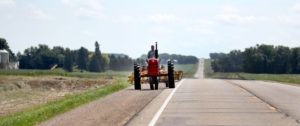Josephine Marcotty reported this week at the Minneapolis Star Tribune that, “A showdown over roadside mowing in rural Minnesota has unleashed a surprisingly passionate debate at the Legislature about the culture of farming, property rights and the desperate plight of bees and monarch butterflies.
“It’s put wildlife in a fierce — but so far losing — competition with Minnesota farmers for the right to the increasingly valuable grass, flowers and other vegetation that grow along 175,000 acres of state-owned roads across the state.
“A bill headed for a vote on the House floor would prevent the Minnesota Department of Transportation from asking landowners to get a permit before they mow roadside ditches and grassy shoulders — something farmers say they’ve been doing for decades without government intrusion.”

“A farmer returned to his farm on Hwy. 30 after raking ditch hay with his tractor. The state wants farmers to get permits to mow ditches, hoping to preserve the grassy strips along roads for wildlife habitat. But farmers say they rely on harvesting the grass to feed livestock.” (PHOTO and CAPTION from the Minneapolis Star Tribune).
The Star-Tribune article noted that, “As corn, soybeans and other row crops have expanded across the state, Minnesota has lost large expanses of grass and other crops available for livestock forage;” and the article added that, “Now, some farmers say roadside mowing is the only source of hay for their animals.
“The shift also means there is far less wild growth for pheasants, managed honeybees, wild insects and, perhaps most critically of all, monarchs, which can only reproduce on milkweed that is rapidly disappearing.”
This week’s article added that, “In rural Minnesota, landowners adjacent to the roads largely believe they own the land to the centerline and the government has rights to use it, he said. While that’s largely true for county and township roads, it’s not so for the state.”
And the article pointed out that, “[I]n a fragmented landscape, roadsides provide badly needed connections for animals and insects to move from one place to another and for plants to pollinate, said wildlife experts.”
“For now, however, legislation is well on its way in both the House and Senate, and it seems likely that the farmers will retain freedom to mow along state roads,” the Star Tribune article said.

